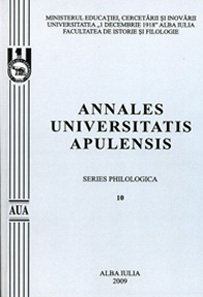INTERDISCIPLINARITY OF TRANSLATION ANALYSIS:A SUBLIME IN GEORGIAN VERSE, INTERTEXTUALITY AND SYMBOLS IN RUSSO-ENGLISH TRANSLATIONS
INTERDISCIPLINARITY OF TRANSLATION ANALYSIS:A SUBLIME IN GEORGIAN VERSE, INTERTEXTUALITY AND SYMBOLS IN RUSSO-ENGLISH TRANSLATIONS
Author(s): Khatuna BeridzeSubject(s): Literary Texts
Published by: Universitatea »1 Decembrie 1918« Alba Iulia
Keywords: eagle; symbol; poetry; semiotics; postcolonial; intertextuality; translation
Summary/Abstract: In the Post-Soviet era scholars have not yet drawn parallels between the concepts: post soviet and postcolonial. Although the concept post soviet can be best described as a unique case of colonial experience, this cliché does not provide for the rational and in-depth examination of the post soviet literary legacy. Therefore, the paper offers an alternative postcolonial theoretical perspective for the critical study of translation and literature, with the focus on Georgian literary texts in translation. The interdisciplinary approach to the research involves postcolonial assessments and discussions, more on the “autonomy of the translation, representing the peripheral culture of the colonized, than on the authority of the original, representing the central culture of the colonizers” (Snell-Hornby, 2006:59). The interdisciplinary critical analysis of post soviet literature will reflect the influence of the Russification regime, and role of censorship on the translated literature, and on the national cultural values. Moreover, paying timely heed to this problem will be advantageous for the Georgian literature and further development of literary translation. The postcolonial approach to the translation of Georgian poets into Russian pursues the stipulation of R. Suny, which points out that Russian romanticism feminized the image of Georgians. This stipulation was further argued for by H. Ram in his extensive paper: “Towards a Cross-Cultural Poetics of the Contact Zone: Romantic, Modernist, and Soviet Intertextualities in Boris Pasternak’s Translations of Titsian Tabidze”. In this light, the current paper exemplifies irreparable transgressions of the author’s primary intention in the Russian translations, which detract the pivotal significance of the theme and the idea, leaving no reference to the allegories of national heroism and resistance. The paper draws parallels between the poem The Eagle by the XIX-XX cc. Georgian poet Vazha-Pshavela, and its two English and two Russian translations by D. Rayfield, G. Hewitt and A. Tarkovskey and N. Zabolot’ski successively. It sets the main objective to answer the question whether or not the spirit and image of the national writer, striving for independence from the Empire, are observed in English and Russian translations. Analyzing invariants of an eagle as a symbol, the paper classifies mythological, religious and popular images, allusions, allegories and metaphors; further, the invariants are viewed as the following virtues: freedom, dignity, pride, power and sovereignty. Across the literary intertexts these virtues are symbolically ascribed to Motherland, a king, a herald, and a outstanding poet. Analyzing the intertextualities of the Georgian verse The Eagle, and its symbolic uniqueness, the paper posits the argument that there are conceptual clashes between the symbols of the eagle in Georgian verse and the eagle in the Pushkin’s verse: The Captive.
Journal: Annales Universitatis Apulensis. Series Philologica
- Issue Year: 11/2010
- Issue No: 4
- Page Range: 29-42
- Page Count: 14
- Language: English

